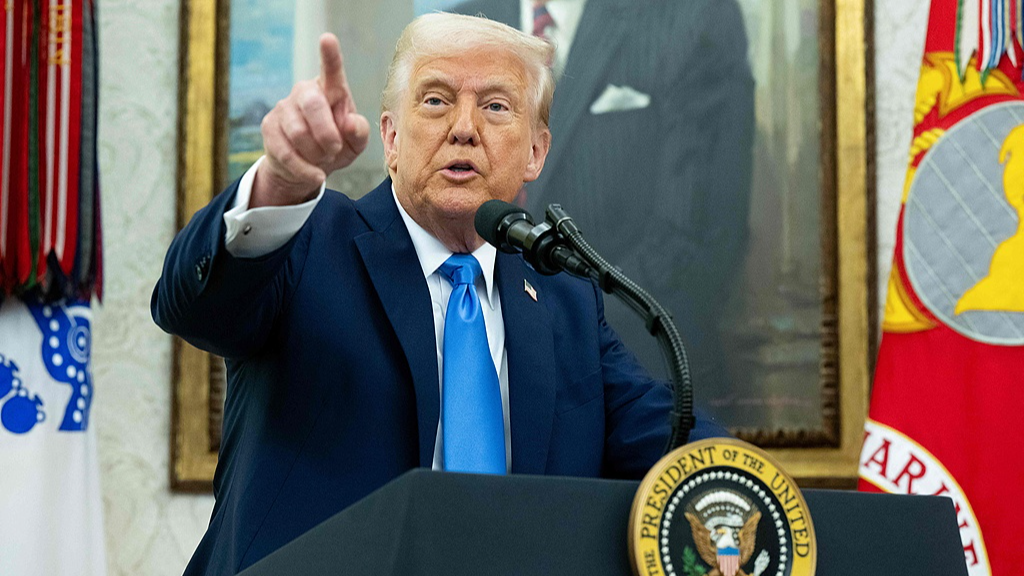
U.S. President Donald Trump speaks in the Oval Office of the White House in Washington, D.C., March 28, 2025. /VCG
U.S. President Donald Trump speaks in the Oval Office of the White House in Washington, D.C., March 28, 2025. /VCG
U.S. President Donald Trump said on Sunday that he was "pissed off" at Russian President Vladimir Putin and would impose secondary tariffs of 25 percent to 50 percent on buyers of Russian oil if he felt Moscow was blocking his efforts to end the Ukraine conflict.
Trump told NBC News he was very angry after Putin criticized the credibility of Ukrainian President Volodymyr Zelenskyy's leadership last week, the network reported, citing a telephone interview early on Sunday.
Since taking office in January, Trump has been trying to broker an end to the Russia-Ukraine conflict. His sharp comments about Putin on Sunday reflect his growing frustration over the lack of progress on a ceasefire.
Trump said he could impose the new trade measures within a month and planned to speak with Putin this week. There was no immediate reaction from Moscow.
On Friday, Putin suggested that Ukraine could be placed under a form of temporary administration to allow for new elections that could push out Zelenskyy.
**Growing pressure to end conflict**
Trump's comments about Putin followed a day of meetings with Finnish President Alexander Stubb on Saturday during Stubb's surprise visit to Florida.
Stubb's office said on Sunday that he told Trump a deadline needed to be set for establishing a Russia-Ukraine ceasefire to ensure it happens and suggested April 20, as Trump would have been in office for three months by then.
U.S. officials have separately been pushing Kyiv to accept a critical minerals agreement, a summary of which suggested that Washington was demanding control over Ukraine's natural resource income for years. Zelenskyy has said Kyiv's lawyers need to review the draft before he can comment further on the U.S. offer.
Following negotiations between the U.S. and Ukraine over the minerals deal, Putin also offered the U.S. a future economic agreement to jointly explore Russia's rare earth metal deposits.
The Izvestia media outlet reported on Monday that Moscow and Washington had begun talks on joint rare earth metal and other projects in Russia. It also reported that the cooperation could be further discussed at the next round of Russia-U.S. talks, which may take place in mid-April in Saudi Arabia.
Trump has been threatening and imposing tariffs on U.S. imports from countries with trade surpluses since taking office. He also levied heavy tariffs on steel, aluminum and cars, which hit key U.S. allies such as Canada and the EU.
His latest tariff threats would cause another round of disruption across the U.S., according to William Reinsch, a former senior Commerce Department official now at the Center for Strategic and International Studies. He said the haphazard way Trump was announcing and threatening tariffs left many questions unanswered, including how U.S. officials could trace and prove which countries were buying Russian oil.
Trump set the stage for Sunday's news by imposing a 25 percent secondary tariff last week on U.S. imports from any country buying oil or gas from Venezuela.
In addition, Trump on Sunday also threatened to hit buyers of Iranian oil with secondary sanctions if Tehran did not reach an agreement to end its nuclear weapons program. Earlier in March, Trump had written to Iran's Supreme Leader Ayatollah Ali Khamenei, warning that Tehran must either agree to fresh negotiations or face a military confrontation.
Iranian President Masoud Pezeshkian said on Sunday that Iran has rejected the option of direct talks but is open to indirect negotiations. Pezeshkian stressed that while Iran is not opposed to negotiations in principle, Washington must first rectify its past "misconduct" and rebuild trust.
(With input from agencies)